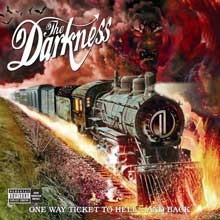Most people don’t get the Darkness. Considering the unitards they like to prance around in, it’s easy to understand why. “Joke band,” some call them. On the other hand, those who do claim to “get them” usually don’t have a clue either.
Yes, the Darkness are post-modern arena-rock gods—they get that much right. But the lofty pretension needed to transform them into their idols like Queen (rather than just react to them, hence the whole post-modern thing), is beyond them. British pretension a la Coldplay is pretty much the foil that makes the Darkness work. After all, everything about them is over the top, from their Big Hair rock-style guitar riffs to singer Justin Hawkins’ glass-shattering falsetto.
Their first album, Permission to Land, reveled in such antiquated, large-scale rock musicianship, offering a tongue-in-cheek nod to a style of rock long ago supplanted by furrowed brows and angsty whining. It celebrated rock’s clichéd excesses such as sex, drugs, and partying. Their sophomore effort One Way Ticket to Hell...and Back bookends the debut by looking at the flipside of those excesses: rehab and sobering up, long-term relationships, and balding.
| One way ticket to hell...and back The Darkness (Atlantic) |
With One Way Ticket, they gloss up their sound thanks to producer Roy Thomas Baker (Queen, the Cars) and focus more on mass-producing even more contagious hooks and choruses—dialing down Hawkins’ rookie habit of letting loose his high-pitched voice every chance he could get. They get it right so often that it’s not until seven tracks into the album (“Bald”) before they stumble. “Hazel Eyes” and “Girlfriend” are easily the album’s highlights, while at least three others seem as soundtrack-ready as Permission’s “I Believe in a Thing Called Love.”
“Blind Man” wraps it up with a “Bohemian Rhapsody”-like operetta that Baker can be blamed or—if you’re a Queen fan—thanked for. For a moment, you almost forget who you’re listening to, which could be a good thing or bad thing, depending on whether or not you “get it.” •


